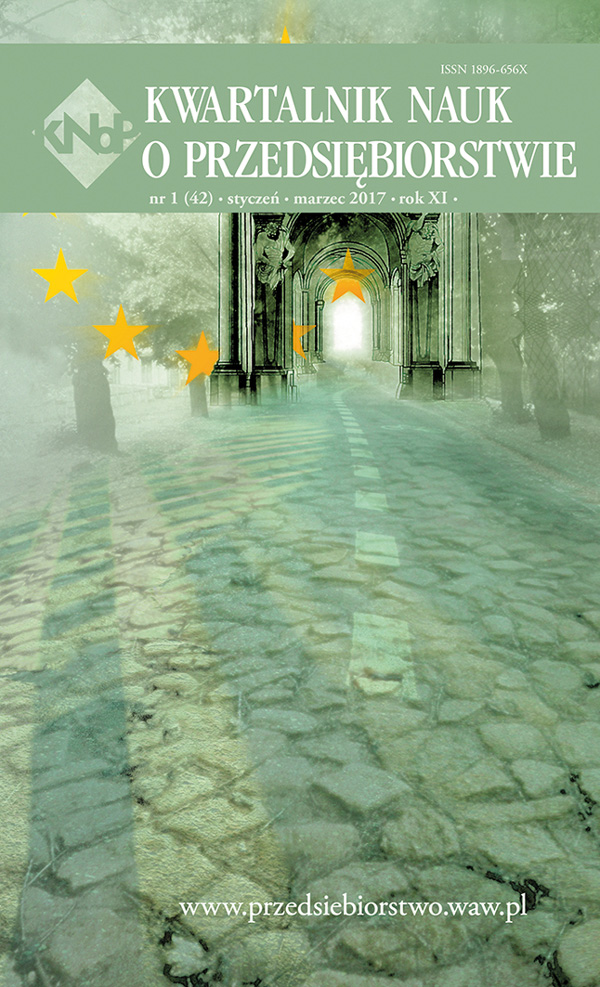Economics and politics of the zloty to euro conversion
Main Article Content
Abstract
Among 11 post-socialist countries which have already became members of the EU, only five have joined the common currency euro area. The remaining six do not make use of this right and do not fulfil their obligation. Poland, the largest economy of the region, is in this group. It has both causes and implications of economic and political nature. According to the Author, the Eastern European members of the monetary union should enter the euro area, as it is not only in the case of Poland that the benefits resulting from that entry considerably outweigh the costs associated with the conversion. At the same time, the accession of new countries, especially Poland, to the euro area, would positively affect the process of European integration.
Downloads
Article Details
The author of the article declares that the submitted article does not infringe the copyrights of third parties. The author agrees to subject the article to the review procedure and to make editorial changes. The author transfers, free of charge, to SGH Publishing House the author's economic rights to the work in the fields of exploitation listed in the Article 50 of the Act of 4 February 1994 on Copyright and Related Rights – provided that the work has been accepted for publication and published.
SGH Publishing House holds economic copyrights to all content of the journal. Placing the text of the article in a repository, on the author's home page or on any other page is allowed as long as it does not involve obtaining economic benefits, and the text will be provided with source information (including the title, year, number and internet address of the journal).
References
Assessment [2016], Assessment of the 2016 Convergence Programme for Poland, European Commision, Directorate General Economic and Financial Affairs, Brussels, May 26.
Bałtowski M. (red.) [2016], Ekonomia przyszłości. Wokół nowego pragmatyzmu Grzegorza W. Kołodko, Warszawa, Wydawnictwo Naukowe PWN.
Brown B. [2012], Euro Crash: The Exit Route from Monetary Failure in Europe. The Exit Route from Monetary Failure in Europe, Houndmills, Basingstoke, Hampshire, Palgrave-Macmillan.
Economist [2016], Trump’s World. The new nationalism, “The Economist”, November 19.
Friedman G. [2009], Następne 100 lat. Prognoza na XXI wiek. Mocarstwo nad Wisłą?, Warszawa, AMF PLUS Group.
Galbraith J.K. [2016], Witamy w zatrutym kielichu. Grecki kryzys a przyszłość Europy, Warszawa, Wydawnictwo Naukowe PWN.
Herman A. [2016], Nowy pragmatyzm, „Kwartalnik Nauk o Przedsiębiorstwie”, nr 1(38), s. 4-6.
Hongbing S. [2016], Wojna o pieniądz 3. Epoka walczących królestw, Wrocław, Wektory.
Kawalec S., Pytlarczyk E. [2016], Paradoks euro. Jak wyjść z pułapki wspólnej waluty?, Warszawa, Wydawnictwo Poltext.
Kolodko G.W. [2016], How to Destroy a Country. The Economics and the Politics of the Greek Crisis, “Rivista di Politica Economica”, IV-VI (aprile/giugno).
Kolodko G.W. [2011], Truth, Errors and Lies: Politics and Economics in a Volatile World, New York, Columbia University Press.
Kolodko G.W. [2014 a], Whither the World: The Political Economy of the Future, Houndmills, BasingHoundmills, Basingstoke, Hampshire, Palgrave-Macmillan.
Kolodko G.W. [2014 b], The New Pragmatism, or economics and policy for the future, “Acta Oeconomica”, Vol. 64 (2), s. 139-160.
Kołodko G.W. [2017], Czy Polska zbawi Europę?, „Rzeczpospolita”, 3 stycznia.
McKinnon R. [2002], Mundell, the Euro, and Optimal Currency Arreas, in: Money, Markets, and Mobility: Celebrating the Ideas of Robert E. Mundell Nobel Laureate in Economic Sciences, T.E. Courchene (ed.), Montreal & Kingston-London-Ithaca, McGill-Queen’s University Press.
Mundell R.A. [1961], A Theory of Optimum Currency Areas, “The American Economic Review”, Vol. 51, No. 4, s. 657-665.
Mundell R.A. [2000], The International Financial Architecture. The Euro Zone And Its Enlargement In Eastern Europe, Distinguished Lectures Series, No. 1 (March 7th 2000), Warsaw, Leon Koźmiński Academy of Entrepreneurship and Management (WSPiZ).
Mundell R.A. [2003], The International Monetary System and the Case for a World Currency, Distinguished Lectures Series, No. 12 (23 October 2003), Warsaw, Leon Koźmiński Academy of Entrepreneurship and Management (WSPiZ) and TIGER.
Nuti D.M. [2006], Alternative Fiscal Rules for the New Member States, in: Euro Area Enlargement, CESifo, Munich, 24 November.
Palast G. [2012], Rober Mundell, evil genius of the euro, “The Guardian”, 26 June.
Podkaminer L. [2017], Kto zbawi Europę? „Rzeczpospolita”, 7 stycznia.
Rzońca A. [2017], Wprowadzenie euro jest nierealne, „Rzeczpospolita”, 3 stycznia.
Stańczuk M. [2017], Przyjęcie euro jest w interesie Polski, „Rzeczpospolita”, 11 stycznia.

